The Velvet
Underground
Albums reviewed on this page: The
Velvet Underground & Nico, White
Light/White
Heat, The Velvet Underground,
V.U.,
Loaded, Squeeze
Lou Reed, Transformer, Vintage Violence.
The
Velvet Underground have assumed a rather large position in the
history of American rock today, and are frequently cited as an
influence on all sorts of guitar rock. While you may think I
would be tickled pink to poke holes in this and claim they don't
deserve this honor, I cannot. The Velvet
Underground deserve their accolades. What I never knew
before delving into their catalog is that the band had two distinct
sides. The first is the experimental, urban life side of the
band, which punctuates music with pounding pianos, screeching viola
and insane guitar solos. The other is a lighter guitar rock
band - not quite pop, but not heavy either. It is the former
side that earns them a great deal of credit these days, and it's also
what completely put me off the band when I first heard them.
This dominates on their first two albums with John Cale (The
Velvet Underground & Nico and White
Light/White Heat).
The more normal side to the band does exist on their first couple of
albums, but really comprises most of their last releases (The
Velvet Underground, Loaded and the afterbirth of Squeeze).
So let me say this - start
with the lighter side of the band first, unless you like noise and
distortion with every serving. The first album I ever heard
was White Light/White Heat and its
overamplification and
constructed noise was so off-putting that it turned me off to the
band for a couple of years. So imagine my surprise when upon
listening to their very next album I discovered a collection of
awesome rock songs! Yeah, life's like that
sometimes. Of
course, you have the right to hate them not matter what.
The
ratings here are going to have a wider range of interpretation
than usual - I'd say about a full star, rather than the normal
half.
A good portion of the ratings for the first two albums goes to their
groundbreaking nature, rather than how much fun they are to listen
to. So depending on how you feel about the importance of that
you may want to revise it mentally up or down. I've also
broken
down their first two albums into how they sound vs. how
"groundbreaking" I think they are - to differentiate
between the two grades. Their final two albums don't get any
special bonus. In general let me say only this - VU have
probably been the hardest group for me to assign a rating for
ever.
It's not a cop-out by me to give them roughly the same grade at all -
at least in my perspective - because each of their albums is so damn
different. I honestly think you can construct a
good
argument for any of their albums to be their best,
excepting Squeeze.
Personnel: Lou
Reed (guitar, vocals), Sterling Morrison
(guitar), John Cale (bass, viola, piano, organ,
vocals), Maureen Tucker ("drums" and then
drums), Nico (vocals). Nico quit
after their first album. Cale replaced
by Doug Yule (bass, organ, vocals) after White
Light/White
Heat. Reed quit just before Loaded
was
released in 1970, with Yule
switching to guitar and a new bassist added. Morrison quit the
year afterwards, so they added a keyboardist. Band dissolved 1972.
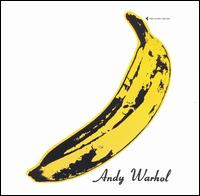 The
Velvet Underground & Nico (Dec. 1966), ***1/2
The
Velvet Underground & Nico (Dec. 1966), ***1/2
By
nature I am suspicious of self consciously arty people and their
work, and my skepticism only increases further with those connected
with the avant-garde. Does studying the avant-garde give your
feedback-laden noise more artistic merit than someone who is simply
bad at their instrument? How can one judge something if it is
intentionally opposed to the criteria by which it is supposed to be
judged? It has been said about art that it
is not what you produce, but how good your explanation is for
it.
Probably the best answer is to take it at face value, as otherwise
all experiments could be judged a success. Being daring or
experimental is one thing, but in order to pull it off one needs to
have the work be interesting. People listen to the minimalist
Terry Riley because his work is interesting, even if it is
minimalism. For the most part, the opposite holds true for
Lou
Reed's Metal Machine Music. It may be an
interesting
idea, but the work itself isn't enjoyable, not to say that it isn't
music. "Art-for-art's sake" isn't necessarily a
problem, as long as it's executed correctly. If Keith Emerson
writes a concerto, just because he studied classical music does not
make it good. But that's not to say someone else in the same
position can't do it and make it successful. So, I consider
going through the motions to make something unusual to not be good
enough, no matter how unusual those motions themselves may be. The
Velvet Underground & Nico has both the
motions and
some substance, although not always simultaneously.
Remove
all the vocals from The
Velvet Underground & Nico
and it is still
blatantly American. It is pop-rock, garage-rock, piano
R&B,
early rock and roll, and folk-rock, all processed through Lou
Reed.
He really had a knack for songwriting (he was, after all, a
professional prior to forming the group), but even where the music is
conventionally appealing, he always snuck abnormality into the
lyrics. With this twisted filter, the
result is the dirty, darkened urban version of all these
genres.
Admittedly, the rest of the band was a collection of characters worthy
of a Ben Jonson play - Sterling Morrison appears to have been
relatively normal, John
Cale was a student of the avant-garde involved with
droning projects, Maureen Tucker a drummer to whom a drum kit might
have been a
perpetual stranger, and Nico was a heavily-accented German
singer.
The music itself is a challenging listen, filled with both
intentionally good and intentionally bad sounds. The pop
songs
are generally slightly unsettling if one digs deep enough ("Sunday
Morning", "I'll Be Your Mirror", "There She
Goes", "Femme Fatale"), but it is clear that Reed was a hell of a
songwriter. He used less readily
adaptable forms; garage-rock transformed through changes in
dynamics and tempo into the infamous "Heroin", where the
the music parallels the self-destruction
in the lyrics. Similarly, the S&M epic "Venus In Furs"
(actually the title of a novel) matches Cale's painfully droning violin
with lyrics like "Now bleeeeed for me."
The band got a bit heavy on the anti-solos, Reed has some of the
most annoying guitar solos ever, intentional or not ("Run Run
Run", "European Son to Delmore Schwartz").
Frankly, some of the songs are a touch too long ("Venus In
Furs", "European Son") and just too damn arty for
their own good occasionally ("The Black Angel's Death Song").
Aside from the parts where their studied avant-gardeness results in
unlistenability, this manages to be both instrumentally and musically
fascinating, if given enough time. Whatever rating this album
receives, it is one the points where American rock and roll grew
up.
"Produced" by Andy Warhol, except Tom
Wilson has
the honor on "Sunday Morning".
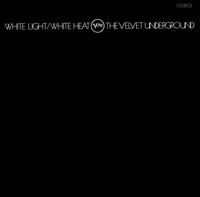 White
Light/White Heat (Dec. 1967), ****
White
Light/White Heat (Dec. 1967), ****
Thanks
to Sgt. Peppers and a messload of hallucinogens,
the rest of
the world also went off in an experimental direction by the time
White Light/White Heat was released, but the Velvets
maintained their difference. Others were going for smiley
faced
nonsense, sound collages or spaced out trips, while Reed led the
group further on their own sonic journey. What really
separated them was that the group never lost their touch with the
basic, common world - there is little abstraction or philosophizing in
their
lyrics, just how things are. Certainly their work is focused
on
the more colorful or "perverse" sides of real life (drug
use, sex, murder, etc.), but it is still far more grounded in reality
than almost everything else. Nico
is gone, and the music is much less pop-oriented in tone. Each
track has basically the same approach - take unusual lyrical topics,
a combination garage/blues/drone playing style, and then distort the
hell out of everything. The album's key is that while the
playing is gruff, it is tuneful as well, avoiding some of the
noise-only aspects of their debut. Generally, there is the
same
twisted Americana sound (the Jerry Lee Lewis-like title track, "Here
She Comes Now") with only a few misfires (the once-is-enough
"The Gift" which is just Cale reading a short story over
some backing, or the crazy lead guitar on "I Head Her Call My
Name"). However, the ultimate test is "Sister Ray",
where everything is washed everything into a dungy sound with Reed
and Cale (on a messed up organ) playing around a steady beat on
around three chords for over seventeen minutes. The
description is nightmarish (echoes of Web
of Sound)
but the music is absolutely fantastic; mainly because Reed's
lyrics are interesting (drag queen, sailors, police, et al.) and he
and Cale do everything right when they play, making it the
most fascinating drone-influenced experimental tracks.
It speaks volumes that one can listen to it three times and want to
come back for more. White
Light/White Heat is loud, harsh, and
dirty, but in a different way than metal or hard rock, and the
inspiration for plenty of distortion-heavy guitar bands.
Produced by Tom Wilson.
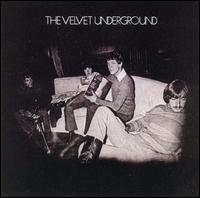 The
Velvet Underground (Mar. 1969), ****
The
Velvet Underground (Mar. 1969), ****
A complete
180 from their prior album: clean sounding,
straightforward and downright mainstream in parts.
Consequently, this is where many consider the band to have sold out,
and a lot of blame gets put on newcomer Doug Yule, who replaced
Cale. I would argue this is the VU of "Sunday
Morning" - quiet folk and blues oriented and without the urban
grittiness of their first two albums, but most of the material is
sexual in nature (implicitly or explicitly). It falls
somewhere
between straight folk-rock and the Kinks' bounciness,
with little soloing or excess. By
referencing the Kinks I mean only in the directions they take, like
their expression of happiness ("Beginning to See the Light")
and some jaunty retro tunes ("That's the Story of My Life",
Tucker's vocal spotlight "After Hours"), not to say that
they really sound similar. However, the Underground's own
gentle pop sound really shines on The Velvet Underground--with
the quiet nature of "Pale Blue Eyes" or "Jesus"
or "Candy Says". The only really experimental track
is one of lyrics rather than instruments ("The Murder Mystery"
with overlapping vocals) likely due to Cale's departure, and there
are relatively few down points ("What Goes On" is a great
guitar-rock song, but it's needlessly extended and "I'm Set
Free" is a bit weak). This is their first album where I
can safely say that none of the rating is comprised of points for
boundary-pushing, and reflects how much fun it is to listen to this
album. It is so normal that I do not have much to say, except
that it turns out they excel at actually playing guitar-rock straight
up as well. Self-produced.
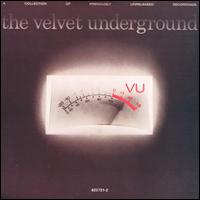 VU
(rec. 1968-9, rel. 1985), ****1/2
VU
(rec. 1968-9, rel. 1985), ****1/2
Granted,
the Underground may not have been a contemporary label's dream client
(a discomforting
realist approach sex, drugs, rock/n/roll),
but they had really cleaned up their act. Well, they cleaned up their
sound at least by the time The Velvet Underground was
released. The group then recorded another album's worth of tracks,
which MGM/Verve prepared before getting cold feet. MGM seemed to have
had a plan to become a horrific, horrific label, which included
brilliant ideas like the Bosstown
sound, and then dumping drug-related acts from the label in 1970. Way
to stay popular guys - why not just go bulk up on some crooners and
ignore the kids. Who needs their money, anyway? They're probably off
buying h-balls from unwashed vagrants in the back alleys of town.
Middle-class white folks - that's the ticket. Now go rustle up some
more folk singers, Marv.
VU
is not The Great Lost Velvet Underground album, but a large portion
of it, along with a couple of Cale-era tracks. All of these date from
the post-feedback era, where the band focused on straightforward
songcraft, without wails, and less obvious references to the more
consuming aspects of life. They retained their damn
unique
sound - the persistent rhythm of Tucker's simple beats, with
uncluttered bass and rhythm guitar. This lockstep is mirrored
somewhat in the squalls of overarching feedback
they employed occasionally
("I Can't Stand It") but provided enough space for
snappy little guitar lines or Reed's offhand lyrical delivery. Only
"Ocean" fails to provide enough cover for the music,
instead relying on the band's soothing repetitive noise. Reed's
interest in country ("One of These Days"), 50s music
(portions of "She's My Best Friend", and heartfelt pop
("Stephanie Says" - a direct descendant of tracks like
"Sunday Morning") all appear here. One thing not mentioned
enough is his strange lyrical gift which allows him to drop non
sequiters ("electricity comes from other planets" crops up
in "Temptation Inside Your Heart"), bad jokes, and
generally odd twists on normal topics (the odd love imagery in
"Andy's Chest", "I Can't Stand It") successfully
into songs. He also continues his investigations into wayward
individuals ("Stephanie Says", "Candy Says") and
the seedier side of life (the oblique lyrics in "Foggy Notion").
So, just your typical VU album. All these tracks are excellent, with
"Ocean" running a bit slow and the Lou/Maureen duet piece
"I'm Sticking With You" suffering from a dragging
arrangement. While the remainder of the Great Lost Tapes was released
as part of Another View, this collection serves as
a excellent
album by itself.
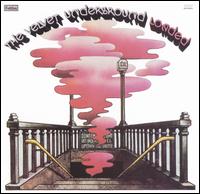 Loaded
(Aug. 1970), ****1/2
Loaded
(Aug. 1970), ****1/2
A
good portion of fans hate this album, seeing it as a final commercial
sellout, and accordingly asking for the Yule-log to be thrown onto
the fire. While Loaded
has not a shred of the Velvet's
trademark experimentalism, the band's sound doesn't suffer for
it.
The Velvets were pretty much still doing their own refined
garage/folk thing, even with all the harsh elements have been
removed. Try and think of it like this. Let's say
the
Rolling Stones did not start out as a R&B/blues band, and
instead
went for R&B/folk-rock and were American. Our
hypothetical
band was not quite as talented at their instruments and so they
decided to keep things tight - shorter, lighter songs with that same
groove and a touch of county twang. Loaded
has that
sound in spades, varying from quieter folk ("New Age") to
just grooving like mad ("Cool it Down", "Sweet Jane",
"Rock and Roll") to harder rock ("Head Held High",
the chugging "Train Round the Bend" both of which bear a
passing resemblance to fellow NY rockers Elephant's
Memory).
Reed always was drawing on a variety of Americana, and that shows up
here on tracks like the acoustic-pop "Who Loves the Sun" or
the 50s doo-wop tribute "I Found a Reason", making this
album as strong as a Stones album, but far more diverse.
Vocally, Reed finds a good balance between talking-singing and
regular singing and delegates some tracks to Yule's unremarkable
tenor. Reed's lyrics are a few shades darker as well,
although
not a return to the early days. There are only a few weak
spots
overall, and "Lonesome Cowboy Bill" is the only true
throw-away track. Reed quit the group just before this was to
be released, which is widely credited as one of the reasons Loaded
did not chart. Tucker was pregnant during the recording, so
even though she is credited on drums others (including Yule's
brother) filled in. Produced by the group, Adrian Barber and
Shel Kagan in a variety of sessions.
I've listened
to the Fully Loaded CD version, but only have the
following to
things to say about it - 1) I think my old vinyl version sounds
better, and 2) You better really love alternate versions, because
there are only a few real outtakes, mostly of slower material.
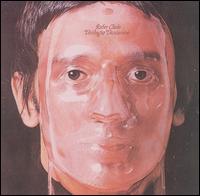 John
Cale: Vintage Violence (1970), ***1/2
John
Cale: Vintage Violence (1970), ***1/2
Three
years after Vintage Violence's
release Michael Crichton made a film entitled "Westworld"
featuring
a
futuristic amusement park where you could go into the Old West for
your vacation. None of his work with VU would suggest that he
had such desires, but this album could be Cale's Wild West pop
fantasy.
In other words, this is John Cale mixing singer/songwriter,
country-rock, pop and roots-rock into a nice friendly sound.
And well, why not? It's not like anybody had really heard VU
at
this point, so Cale was free to take the opposite tack. To do
this, Cale and co-producer Lewis Merenstein (Astral Weeks)
brought in a band to back Cale's piano playing up (Garland Jeffreys
and Grinder's Switch, and no, I haven't heard of them either), and
the result is a whole lot of rhythm playing. So that means no
droning viola, no feedback-laden guitar solos, nothing really
sticking out at all, except that they put Cale's voice on the top of
his rather simple songs. There is a great spacey feel on the
record in parts, partially due to occasional pedal steel overdubs in
the background (the fantastic chorus on "Gideon's Bible",
"Please"), and a slower beat ("Big White Cloud"),
leading parts towards almost a ballad feel. I'm not sure how
much mainstream success Cale thought he might get - every coherent
pop song ("Adelaide", the bubblegum "Cleo") seems
to be countered by moments where you don't have a clue what he's
going on about ("Gideon's Bible", "Ghost Story").
The sound is very consistent, although they do break the formula for
a nice reflective acoustic guitar song ("Amsterdam").
All in all, though, a very solid effort, once you get past who did
it, and that creepy cover. May deserve a higher rating.
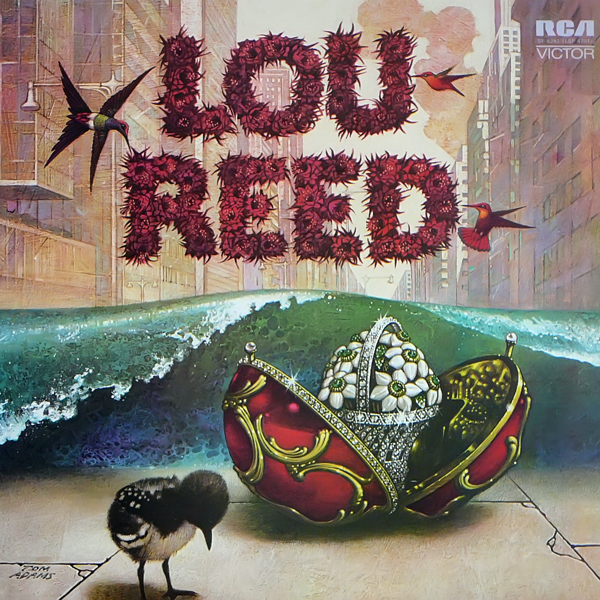 Lou Reed (May 1972), **1/2
Lou Reed (May 1972), **1/2
Look,
I
don't want to think of Lou Reed as a "singer-songwriter."
He's
not James Taylor, Jackson Browne, Jimmy Buffet or even Elton John.
He's Lou Reed, who talks about heroin, prostitutes, people
mailing themselves, love and rock and roll. Or at least he
did, even if he mellowed out with Loaded.
Lou
Reed
isn't so much a failure as it is the wrong setting. One
problem is that production treats Reed like a singer-songwriter,
surrounding him with session guys who despite their talent (they
include Caleb Quaye, Steve Howe and
Rick Wakeman),
fail to contribute much beyond filling out the sound. (A
prime
example is Clem Cattini's repetitive drum fills). Reed's
attitude
is also generally relaxed, like he's strolling down the street with a
chick on each arm (there are female backing vocals, yes), sometimes
riled up, sometimes not. (See also: bird nests, birds, Fabergé eggs on album
cover.) Reed
had built up a sizable catalog of songs that the VU never
released, despite recording, so he had a cache to draw from.
But these songs are not
particularly provacative, unlike
his earlier VU work. The other big problem is that most of
the VU
versions of these songs have been released, rendering these version
lame and unnecessary ("I Can't Stand It", "Lisa Says" are nowhere as
good as those on VU,
for example).
Yes, Reed sounds kind of lame, surrounded by his backers and
lacking any sort of instrumental spark or interesting lead instruments.
This is the wrong place for him, and even if the songs are
fine
(and they are), he was hanging out with the wrong crowd of Elton John
backers and Yes members. (Compare this with Squeeze
where the problem wasn't the wrong people stifling the material, it was
the total lack of people.) This may have been an attempt to
make
him a mainstream artist, which might have worked, given an actual band.
Produced by Richard Robinson.
Lou Reed: Transformer
(Nov. 1972), ****
Wow. Reed had connected with fan David Bowie and his sideman Mick Ronson, who together produced Transformer. The result sounds a lot like Bowie's Hunky Dory:
hard rock which doesn't overpower, VU chugging, and more emergence of
more cabaret material. Basically, Bowie emphasized the glam
elements in Reed's approach, turning the guitars up a bit, adding backing
vocals and piano trills. Reed's lyrics are an excellent mixture
of NY street characters and . Ronson provides something
like a ballad ("Perfect Day"). Transformer was an unexpected popular success - the d"Walk on the Wild" was probably the only song about transvestites
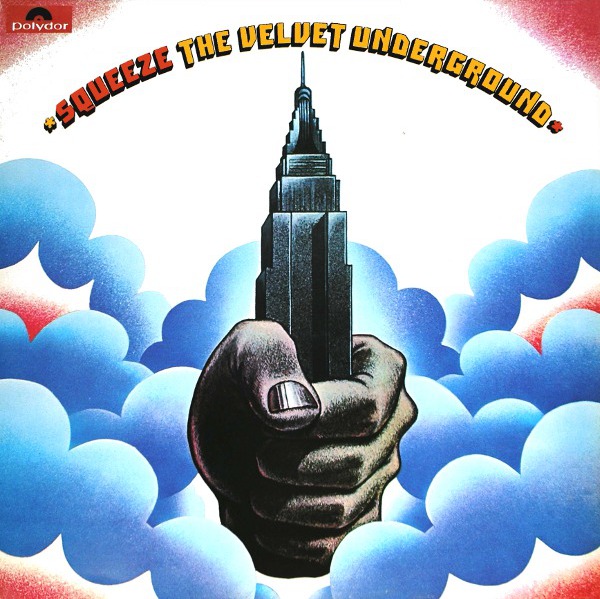 Squeeze
(Feb. 1973), **
Squeeze
(Feb. 1973), **
or Doug Yule Tries to Re-Create the
Band Almost Entirely By Himself. Squeeze
is the Velvet Underground album that everyone ignores, but it isn't
awful. Due to their manager's machinations, everyone else
from a
Velvet Underground tour in Europe was sent home, leaving Yule to record
the album almost alone. Unlike Lou Reed's solo experience,
Yule
recorded almost everything except the drums (a moonlighting Ian
Paice). The
songs on Squeeze sound
like VU songs, in the way that Michel Gondry films have recreations of
places and things which are obviously fake. Perhaps that's a
bit
too harsh - some songs (not the performances) might have been
rejected from Loaded for
being too light ("Caroline", "She'll Make You Cry"). Instead
of Reed's blunt realism, Squeeze
has a lot of Yule character studies which don't do much lyrically
("Caroline", "Louise", "Crash", "Dopey
Joe"). Yule
also tilts more towards light
boogie-woogie ("Send No Letter" "Jack and June") and includes an
earnest folk-rock song ("Friends"). Yet, Yule's songs are
not
bad, even if he's aping Reed, and could have been fine if recorded by an actual band (or even
session musicians) - "She'll Make You Cry", "Caroline" and "Send No
Letter" all have some merit to them, and I rather like his relationship
post-mortem lyrics on "Wordless" even if the song drives itself into a
ditch.
The
big problem is execution - Yule was a competent bassist and organ
player. As a lead guitarist he just cranks out rote notes on
the
pentatonic scale, without any phrasing. Hearing inferior
attempts
at VU vocal harmonies ("Louise", "Send No Letter") or guitar breaks
("Little Jack", "Wordless", "Send No Letter") shows a struggle to
continue the band's sound, when Yule alone clearly cannot pull it off.
The fact that he was trying to play against himself
accentuates
this, and makes things sound flat. The one song given horns
and
backing singers is really helped by this - "Dopey
Joe" an otherwise okay song about a mentally ill/homeless guy, but even
the added people are no panacea. There's
no edge in the playing or lyrics, and none of Reed's pathos in Squeeze.
Not awful, but clearly not the real article.
Given that many
artists can create good work solo (Todd Rundgen, Wild Nothing) - why is
Squeeze
so bad? My guess is that a large culprit is that it was
recorded
in a studio, so Yule didn't have the luxury of taking his time
recording. I'm not saying I could make a better album than Squeeze on my
4-track, but I might come close.
Nico:
The End (1974)
Her
fourth solo album, and the only one I own. Hurrah!
Don't You Know
You'll Stain the Carpet? ...well, do it on the Music page at least.
 The
Velvet Underground & Nico (Dec. 1966), ***1/2
The
Velvet Underground & Nico (Dec. 1966), ***1/2 White
Light/White Heat (Dec. 1967), ****
White
Light/White Heat (Dec. 1967), **** The
Velvet Underground (Mar. 1969), ****
The
Velvet Underground (Mar. 1969), **** VU
(rec. 1968-9, rel. 1985), ****1/2
VU
(rec. 1968-9, rel. 1985), ****1/2 Loaded
(Aug. 1970), ****1/2
Loaded
(Aug. 1970), ****1/2 John
Cale: Vintage Violence (1970), ***1/2
John
Cale: Vintage Violence (1970), ***1/2 Lou Reed (May 1972),
Lou Reed (May 1972),  Squeeze
(Feb. 1973),
Squeeze
(Feb. 1973),